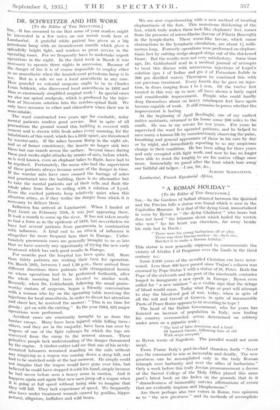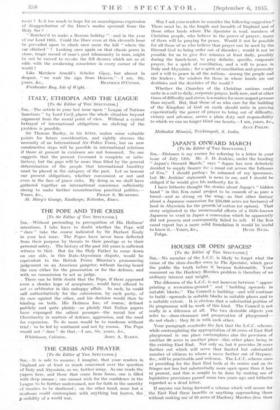A ROMAN HOLIDAY "
[To the Editor of Tins SPECTATOR.] Sin,—In the Gardens of Sallust situated between the Quirinal and the Pincian hills a statue was found which is now in the Capitoline Museum. It is that of the dying Gaul, immortalised in verse by Byron as " the dying Gladiator " who hears but does not heed "the inhuman shout which hailed the wretch who won " for his heart was elsewhere, far away beside his rude but in Dacia :
" There were his young barbarians all at play, There was their Daeisn mother—he, their sire, Buteher'd to make a Roman holiday."
This statue is now generally supposed to commemorate the victory of Attalus I of Pergamus over the Gauls in the third century n.e. Some 2,000 years of the so-called Christian era have inter- vened. Less than 400 have passed since Trajan's column was crowned by Pope Sixtus V with a statue of St. Peter. Both the Pope of the sixteenth and the poet of the nineteenth centuries longed to inaugurate a new epoch in Europe ; Byron even called for " a new rainbow " as a visible sign that the deluge of blood would cease. Today what Pope or poet will attempt to stay the blood-red god of war, today, when in spite of all the toil and travail at Geneva, in spite of innumerable Pacts of Peace Rome appears to be reverting to type ?
The head of the Italian Government, who for years has fostered an increase of population in Italy, now finding his country overcrowded, seems determined on robbery •
under arms on a gigantic scale : " The fool of false dominion and a kind Of bastard Caesar, following him of old
al,;he parallel would not seem
wrotWeitohf N inept. steapis)oulenoenqu as Byron .
From Fiume Italy's poet-in-chief thunders forth " Never was the command to win so inexorable and deadly. The new greatness can be accomplished only in the truly Roman triumph over barbarity and over the allies of barbarians." Only a week before this truly Jovian pronouncement a decree of the Sacred College of the Holy Office placed this same poet's latest book on the Index on the grounds. that in it " shamelessness of immorality outvies affirmations of errors that are evidently impious and blasphemous."
Are there perhaps also two voices in Rome, two opinions as to " the new greatness " and its methods of accomplish,
ment ? Is it too much to hope for an unambiguous expression of disapprobation of the Duce's modus operandi from. the Holy See ? •
• • .
" Buteher'd to make a Ii oman holiday "----and in the year of our Lord 1935. Could the Duce even at this eleventh hour be prevailed upon to climb once more the hill " where the car climbed " ? Looking once again on that classic poem in stone, tragic record of man's past inhumanity to man,, might he not be moved to revoke the fell decrees which are so at odds with the awakening conscience in every corner of the world ?
Like Matthew Arnold's Scholar Gipsy, but almost in despair, " we wait the sign from Heaven."—I am, Sir, yours, &e., BEATRICE O'CONOR. Freshwater Bay, Isle of Wight.







































 Previous page
Previous page